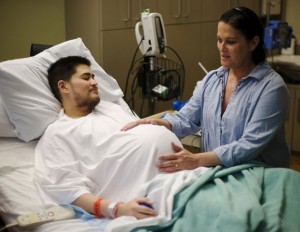A Pregnant Man’s Divorce May Establish the Future of Family Law
The LGBT movement presents huge challenges to family law and to divorce law in particular. It is currently a legal nightmare for same sex spouses who wish to divorce. Although there are a handful of states which will legally allow same sex couples to marry, these marriages are not often upheld in other states. This can be very important, because the states which recognize same sex marriage do not always have great job markets (no causation implied), thus necessitating moving to another state. Once the move is made however, the relationship, like many other relationships, cannot always be sustained and divorce is imminent. Divorce, however, has residency requirements which marriage does not have, thereby preventing the couple from simply moving back to the state in which they were married. These are big legal problems facing homosexual spouses, but the question of transgender divorce hasn’t been addressed yet. Until now.
Thomas Beatie was born a girl in Hawaii. Thomas underwent a sex change operation in his 20s and had all his legal documents, birth certificate, driver’s license and passports, changed to reflect his gender. He married Nancy in Hawaii in 2003, and then the couple moved to Arizona. Since Nancy was unable to have children, the couple decided to use donated sperm to impregnate Thomas instead. Thomas gave birth to Susan, Austin and Jensen Beatie in 2008, 2009 and 2010 respectively. In 2012 though, Thomas and Nancy filed for divorce. Thomas was awarded sole custody after a videotape showed Nancy as a violent alcoholic addict in front of the children. The divorce, however, has not been finalized because the judge is deliberating on whenever Thomas is a man or woman.
 Although the case has many quirks, the divorce hinges on the gender question. If Thomas Beatie is considered a woman, the marriage will be invalid, as same-sex marriage is not legal in Arizona. Thomas and Nancy Beatie would be unable to divorce in that instance, since legally they were never considered married in the first place. If Thomas Beatie is considered a man, then the divorce will proceed as normal. The judge, however, has two reasons to doubt Thomas’s legal status as a man. First Thomas was pregnant and gave birth three times. If Thomas is ruled a man, then the court has to accept that men can become pregnant. Second, Thomas still has female organs. People who have female organs are generally considered women. This case is highly unusual and will almost certainly be used as precedent in future divorce cases.
Although the case has many quirks, the divorce hinges on the gender question. If Thomas Beatie is considered a woman, the marriage will be invalid, as same-sex marriage is not legal in Arizona. Thomas and Nancy Beatie would be unable to divorce in that instance, since legally they were never considered married in the first place. If Thomas Beatie is considered a man, then the divorce will proceed as normal. The judge, however, has two reasons to doubt Thomas’s legal status as a man. First Thomas was pregnant and gave birth three times. If Thomas is ruled a man, then the court has to accept that men can become pregnant. Second, Thomas still has female organs. People who have female organs are generally considered women. This case is highly unusual and will almost certainly be used as precedent in future divorce cases.
Although the judge’s bafflement is understandable, there are certain considerations which could settle the case. It has long been assumed that only women can be pregnant; men cannot physically have a child germinate inside them. This, however, is only an assumption. The scientific community has theorized that certain surgical procedures could allow a (naturally born) man to become pregnant, though it is highly doubtful that the would-be parent would survive the process. Still, male pregnancy is not solely science fiction. It would be more accurate to say that women are better equipped for child birth, not that men can’t do it.
The fact that Thomas Beatie has female reproductive organs should not be relevant in determining his gender. Due to his legal documentation, Thomas will be treated as a man in nearly every aspect of his life, except, apparently, in this divorce case. His children would have to deal with the fact that their father gave birth to them, but that is a private matter within their family, not a legal issue in a court of law.
More importantly though, if the judge denies the validly of the marriage, no real legitimate interest will be served by such a decision. The rule of law is not upheld; as the Federal Constitution’s Full Faith and Credit clause is suppose to ensure that a legal marriage in one state is upheld in the other forty-nine states. The interests of the parties involved are not served, as declaring the marriage invalid would deny Nancy Beatie spousal support, support which Thomas Beatie wishes to pay. Biology may say that Thomas is a woman, but in this case, biology cannot supersede the law or human need.


Comments